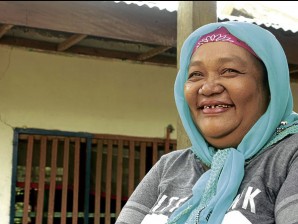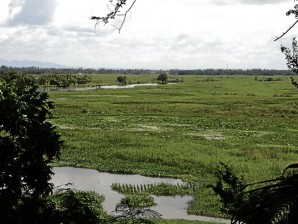Women play key role in peace process

MORO WOMEN, like Anabay Buisan, 47, from Barangay Macasampen in Guindulungan, Maguindanao, hope that their rights will be recognized in the Bangsamoro law that will be drafted by the Transition Commission. ANNA RIDOUT/CONTRIBUTOR
This is my first visit to the Philippines. I usually campaign for peace in Congo, Somalia and other conflict-affected countries in Africa.
While I was in Mindanao, the African Union met to discuss the ongoing peace negotiations between Sudan and South Sudan. A coalition of women leaders from the two countries addressed the African Union’s high-level panel on Sudan and South Sudan calling on their own governments to include women as negotiators and participants in the peace process.
The meeting was a huge success. The former South African President Thabo Mbeki agreed to create a task force of women specifically mandated to feed information to the process and disseminate information back to communities.
I met Secretary Teresita “Ging” Quintos-Deles, President Aquino’s adviser on the peace process, who said that as the negotiations between the Philippine government and the Moro Islamic Liberation Front (MILF) progress, more and more women have been brought into the Bangsamoro side of the negotiating table.
Most striking over the past two weeks is not that four decades of conflict may officially come to an end over the next four years or that an Islamic insurgency and a Catholic-dominated country have agreed on a process for peace—both extraordinary in themselves—but that the people of Mindanao, in particular the women of Mindanao, have been the key to this success.
A paradigm shift
The Philippines has had to bear the brunt of two of the longest-running insurgencies in the world for decades. In Mindanao alone, the estimated cost of conflict has been $2 billion to $3 billion only from 1970 to 2001, millions of people have fled their homes in fear and tens of thousands have died.
As 2013 begins in earnest, the superstitious 13 is far from people’s minds. Everyone I spoke to believes this is the moment for peace, that both sides are committed to finding a way forward and giving ground if it means an end to conflict.
“You can see in the eyes of the negotiators—commitment and mutual trust,” said Jun Mantawil, head of the MILF peace panel secretariat.
The military has admitted that its agenda, too, has changed.

THE LIGUASAN Marsh, which cuts across the provinces of North Cotabato and Maguindanao, is believed to be a rich source of natural gas and is crucial to the economic development of the Bangsamoro. ANNA RIDOUT/CONTRIBUTOR
“We are shifting the paradigm to make the peace,” said Col. Dickson Hermoso, spokesperson of the military’s 6th Infantry Division. “People are the main concern. There are no shortcuts.”
With huge hopes and expectations in every community and at every consultation meeting, the stakes have never been higher for peace in the Philippines.
However, the number of potential land mines in the process is as real as the residual firepower still in the fields of Mindanao. A long history of land disputes and inequality, as well as the untapped oil and gas of Liguasan Marsh, will test the commitment and trust on both sides.
Great expectations
I was told that Mindanao has been the land of promise for 100 years and you can see why with lush rolling hills, delicious fruits and vegetables and fresh fish aplenty. There are the minerals, of course, and plans for an agro-industrial center by 2020.
But today, there are almost 10,000 people still in evacuation centers or displaced with relatives and countless numbers struggling to make a decent living.
In Macasampen village not far from an MILF camp, the 2,000 people who live there have suffered decades of displacement. They evacuated for the first time in 1998 and then for four years between 2008 and 2011, living in tents on the grounds of a school.
“Our farms are far from here and some people are still too afraid to plant in case conflict starts again and our crops are destroyed,” Anabay Buisan, 47, said.
The conflict has not only destroyed people’s homes but also their potential to feed their families. “Before the conflict, we had a good harvest, but since the fighting started we had to sell our plough to get money,” Buisan said.
Oxfam has been supporting people with flexible mobile jobs, which are easy to move and adapt, such as training women in handicrafts or providing fishers with boats and nets, but much more is needed to rejuvenate much-needed businesses and farms.
On constant watch
There are 18 major tribes in Mindanao and all must have a say in what peace would look like if it is to last beyond the negotiating table.
Time and again, I learn of great work being done to make sure all have a say. UnYPhil-Women, a Muslim women’s organization, will be consulting with women Muslim leaders to find a way for Shari’a law to incorporate women’s rights.
Oxfam has also supported protection initiatives such as Mindanao People’s Caucus, which organized an all-women civilian protection team to monitor abuses against civilians and report ceasefire violations to the authorities.
Such accountability systems are crucial for holding authorities to the pledges they have made.
People power
Mayor Ramon Piang of North Upi town in Maguindanao said success of the peace accord really depends on the people on the ground.
Deles concurred: “As people on the ground have taken the framework positively, it cannot but influence those at the table to meet their expectations.”
Hermoso agreed. “Civil society and women’s groups make the difference. Marching women are the ones who put the pressure on when talks look like they may collapse,” he said.
So everyone agrees. As the process moves forward, it is crucial that local people have a say in what peace will look like. Civil society’s involvement has been the game-changer this time around and local groups must continue to play a fundamental role in making sure the dividends of peace benefit all sections of the population.
———————
(Editor’s Note: The author is one of Oxfam’s humanitarian press officers based in its headquarters in Oxford in Great Britain. She recently visited the Philippines for two weeks to accompany The Guardian UK’s Simon Tisdall, who is doing a story on humanitarian work and disaster risk reduction in the Philippines and the peace process in Mindanao.)














